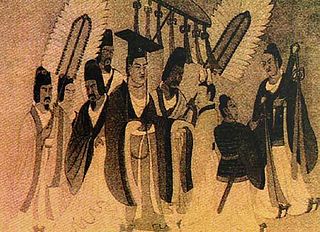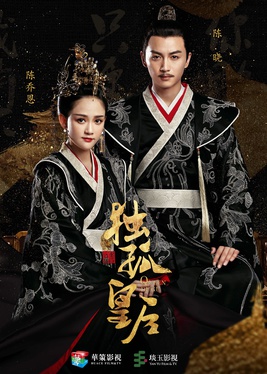
Emperor Taizong of Tang, previously Prince of Qin, personal name Li Shimin, was the second emperor of the Tang dynasty of China, ruling from 626 to 649. He is traditionally regarded as a co-founder of the dynasty for his role in encouraging his father Li Yuan to rebel against the Sui dynasty at Jinyang in 617. Taizong subsequently played a pivotal role in defeating several of the dynasty's most dangerous opponents and solidifying its rule over China proper.

Emperor Xiaowen of Northern Wei ( 魏孝文帝), personal name né Tuoba Hong (拓拔宏), later Yuan Hong (元宏), was an emperor of China's Northern Wei dynasty, reigning from September 20, 471 to April 26, 499.

Emperor Wen of Sui, personal name Yang Jian (楊堅), Xianbei name Puliuru Jian (普六茹堅), alias Narayana deriving from Buddhist terms, was the founder and the first emperor of the Chinese Sui dynasty. As a Buddhist, he encouraged the spread of Buddhism through the state. He is regarded as one of the most important emperors in Chinese history, reunifying China proper in 589 after centuries of division since the independence of the Cheng-Han and Han-Zhao dynasties from the Western Jin dynasty in 304. During his reign, the construction of the Grand Canal began.
Empress Kezuhun was an empress consort and empress dowager of the Xianbei-led Former Yan dynasty of China. Her husband was Murong Jun, who was succeeded by their son Murong Wei.
Empress Kezuhun was an empress of the Xianbei-led Chinese Former Yan dynasty. Her husband was Murong Wei, the last emperor of the state.
Fu Pi, courtesy name Yongshu (永叔), formally Emperor Aiping of (Former) Qin ( 秦哀平帝), was an emperor of the Di-led Former Qin dynasty of China. He was Fu Jiān's oldest son, although not his crown prince, and after Fu Jiān's death at the hands of Yao Chang, the founder of Later Qin, and his brother Fu Hong (苻宏) the Crown Prince was forced to flee to Jin, he claimed imperial title in 385, but was defeated by the Western Yan prince Murong Yong in 386, and then subsequently killed by the Jin general Feng Gai (馮該).
Empress Yang was an empress of the Di-led Former Qin dynasty of China. Her husband was Fu Pi.
Murong Yong, courtesy name Shuming (叔明), was the last emperor of the Xianbei-led Chinese Western Yan dynasty. He was the grandson of Murong Yun (慕容運), the uncle of Former Yan's founder Murong Huang. As a member of Former Yan's imperial clan, he was moved to Guanzhong, Former Qin's capital region, when Former Qin destroyed Former Yan in 370. He was described as poor, and he and his wife made their living by selling boots.

Murong Chui, courtesy name Daoming (道明), Xianbei name Altun (阿六敦), also known by his posthumous name as the Emperor Chengwu of Later Yan (後燕成武帝), was the founding emperor of China's Later Yan dynasty. He was originally a general of the Former Yan. He was a controversial figure in Chinese history, as his military abilities were outstanding, but as he was forced to flee Former Yan due to the jealousies of the regent Murong Ping, he was taken in and trusted by the Former Qin emperor Fu Jiān, but later betrayed him and established Later Yan, leading to a reputation of him as a traitor. Further, his reputation was damaged in that soon after his death, the Later Yan state suffered great defeats at the hands of Northern Wei dynasty's founder Emperor Daowu, leading to the general sense that Murong Chui contributed to the defeats by not building a sound foundation for the empire and by choosing the wrong successor. However he continues to be regarded as a general without parallel during his lifetime for having suffered no defeats throughout his career. Murong Chui's biography in the Book of Jin described him as seven chi and seven cun tall and having long arms.
Duan Jifei was an empress of the Xianbei-led Chinese Southern Yan dynasty. Her husband was the founding emperor Murong De. Her given name is lost to history, but her courtesy name Jifei was recorded and used by historians. Her father was Duan Yi (段儀).
Murong Xi, courtesy name Daowen (道文), formally Emperor Zhaowen of (Later) Yan ( 燕昭文帝), was an emperor of the Xianbei-led Later Yan dynasty of China. He was one of the youngest sons of Murong Chui, and after the death of his nephew Murong Sheng became emperor due to his affair with Murong Sheng's mother, Empress Dowager Ding. He was regarded as a cruel and capricious ruler, who acted at the whims of himself and his wife, Empress Fu Xunying, greatly damaging the Later Yan state. After Empress Fu died in 407, he left the capital Longcheng to bury her, and the soldiers in Longcheng took this chance to rebel and replace him with Murong Bao's adopted son Murong Yun, and Murong Xi himself was captured and killed.
Gao Yun (高雲), at one time Murong Yun (慕容雲), courtesy name Ziyu (子雨), formally Emperor Huiyi of (Later)/(Northern) Yan, was an emperor who, depending on the historian's characterization, was either the last emperor of the Later Yan, or the first emperor of its succeeding state, Northern Yan. He was a descendant of the royal house of Goguryeo (Gaogouli), whose ancestors were captured by the Former Yan. He was adopted into the Later Yan imperial house after helping the emperor Murong Bao put down a rebellion by Murong Bao's son Murong Hui. He became emperor after the people rebelled against the despotic rule of his adoptive uncle Murong Xi, and during his reign, he used the title "Heavenly Prince". In 409, he was assassinated, and after a disturbance, was replaced by his ethnic Han general Feng Ba.
Feng Ba, courtesy name Wenqi (文起), nickname Qizhifa (乞直伐), formally Emperor Wencheng of (Northern) Yan ( 燕文成帝), was an emperor of the Chinese state Northern Yan. He became emperor after Gao Yun, whom he supported in a 407 coup that overthrew Murong Xi of Later Yan, was assassinated in 409. During his reign, Northern Yan largely maintained its territorial integrity but made no headway against the much stronger rival Northern Wei. He was said to have had more than 100 sons, but after his death in 430, his brother and successor Feng Hong had them all executed.
Feng Hong, courtesy name Wentong (文通), formally Emperor Zhaocheng of (Northern) Yan ( 燕昭成帝), was the last monarch of the Chinese Northern Yan dynasty. He seized the throne in 430 when his brother Feng Ba was ill, and he used the title "Heavenly Prince". During his reign, Northern Yan grew increasingly smaller and weaker in light of repeated attacks by rival Northern Wei, and in 436 he evacuated his state and fled to Goguryeo, ending Northern Yan. Once in Goguryeo, however, he assumed the role of Goguryeo's suzerain. King Jangsu of Goguryeo, unable to stand Feng Hong's antics, killed him in 438 although, curiously, he gave Feng Hong a posthumous name.
Empress (Dowager) Feng, formally Empress (Dowager) Wenming was an empress of the Xianbei-led Northern Wei dynasty of China. Her husband was Emperor Wencheng. After her husband's death in 465, she overthrew the autocratic regent Yifu Hun in 466 and became regent over her stepson Emperor Xianwen and remained as such until his adulthood in 467. She subsequently had a falling-out with Emperor Xianwen over his execution of her lover Li Yi (李奕), and she assassinated him and resumed regency over his son Emperor Xiaowen in 476. While Emperor Xiaowen assumed imperial powers upon adulthood, he remained very deferential to her, and she was highly influential until her death in October 490. An enduring legacy of her regency was a series of reforms that led to political recentralization for Northern Wei and future imperial dynasties.
Emperor Xianwen of Northern Wei ( 魏獻文帝), personal name Tuoba Hong, Xianbei name Didouyin (第豆胤), courtesy name Wanmin (萬民), was an emperor of the Xianbei-led Northern Wei dynasty of China. He was the first emperor in Chinese history who, after retiring at age 17 in favor of his 4-year-old son Emperor Xiaowen to become Taishang Huang in 471, continued to hold on to power until his death in 476—when the official history states vaguely that he may have been killed by his stepmother Empress Dowager Feng.
Han Zhangluan, formal personal name Han Feng (韓鳳), was an official of the Chinese Northern Qi dynasty. He was initially a guard commander for Gao Wei when Gao Wei was crown prince, and became a close associate of Gao Wei after Gao Wei became emperor. Late in Gao Wei's reign, he dominated the political scene along with Mu Tipo and Gao Anagong. While not as criticized for corruption as Mu and Gao Anagong were, he was blamed by historians for his rejection of civilians and ethnic Han officials, including the killing of the officials Cui Jishu (崔季舒) and Zhang Diao (張雕) at his instigation.

General and I is a 2017 Chinese television series based on Feng Nong's novel A Lonesome Fragrance Waiting to be Appreciated. Directed by Ju Jueliang and written by Zhang Yongchen, the series stars Wallace Chung, Angelababy, Sun Yizhou and Gan Tingting. General and I aired on Hunan Television from 2 January to 10 February 2017.

Queen Dugu is a 2019 Chinese web series starring Joe Chen and Chen Xiao. It is based on the life of Dugu Jialuo and her husband Yang Jian, the founder of the Sui dynasty. It started airing online via iQiyi, Youku and Tencent on February 11, 2019.
Yang Zhong, Xianbei name Puliuru Nunu (普六茹奴奴), formally known as Duke of Sui (隨國公), was a soldier, later general of the Northern Wei dynasty. He is the father of Yang Jian, the founder of the Sui dynasty.





